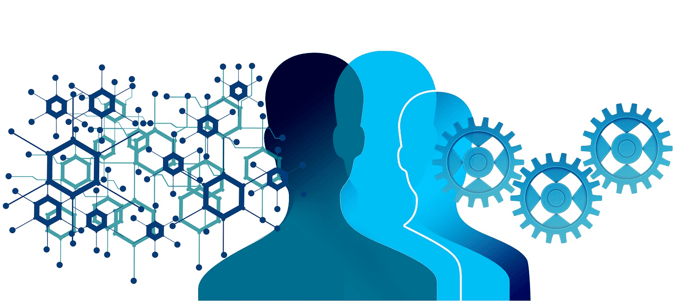Knowledge management in the digital age
By
Bjorn Beck
·
2 minute read
The development of the digital age has an enormous impact on all social groups and the professional world. Digitization in terms of knowledge management is breaking down boundaries and creating new paths in many ways. But what does this mean for modern corporate management?

Knowledge: A valuable resource
Knowledge is a valuable resource not only for each individual person, but also for the generality of an organization.
In the digital age, processes of all kinds are becoming ever faster and thus also more unpredictable.
A small company, which does not represent any potential competition at the beginning, can take the leading market place in the industry tomorrow with the help of digitization.
The targeted and therefore correct handling of knowledge in a company is more important than ever for the company's success, especially now, in the age of digitization, and is therefore a decisive competitive advantage.
In the digital age, processes of all kinds are becoming ever faster and thus also more unpredictable.
A small company, which does not represent any potential competition at the beginning, can take the leading market place in the industry tomorrow with the help of digitization.
The targeted and therefore correct handling of knowledge in a company is more important than ever for the company's success, especially now, in the age of digitization, and is therefore a decisive competitive advantage.
Knowledge Management - Definition
Knowledge management is the effective handling of knowledge information within a company.
To ensure that knowledge is as freely accessible as possible, a high degree of transparency of competencies must be guaranteed.
This is the only way to use the extensive knowledge of the employees for improved processes and effective innovative power, and thus increase the productivity of the organization.
To ensure that knowledge is as freely accessible as possible, a high degree of transparency of competencies must be guaranteed.
This is the only way to use the extensive knowledge of the employees for improved processes and effective innovative power, and thus increase the productivity of the organization.

Knowledge management in digital change
The development of digitization not only leads to economic, but also to personal changes.
In today's world, knowledge is not only available to the privileged and elitist groups of society, but is easily accessible to everyone and, above all, from anywhere.
Within seconds you can get answers to a wide variety of questions from various sources via the search engines.
This development also has an impact on the world of work.
In today's world, knowledge is not only available to the privileged and elitist groups of society, but is easily accessible to everyone and, above all, from anywhere.
Within seconds you can get answers to a wide variety of questions from various sources via the search engines.
This development also has an impact on the world of work.
What does this mean for a company?
The change requires a new way of dealing with information in companies.
The so-called master knowledge, which is used in a classic learning management system (LMS) , is no longer common in many successful companies due to a much greater transparency in relation to information.
In an LMS - unlike in an LXP - there are usually clear hierarchies and structures. Often as a "top-down approach", in which decisions are made from the top of the company hierarchy and these are only communicated to the workforce.
Many associate this organizational structure with additional effort and - especially online - with boring theory.
Clearly: Not everyone needs the entire knowledge of a company.
Nevertheless, every employee should know how to obtain the relevant knowledge as quickly and easily as possible.
The so-called master knowledge, which is used in a classic learning management system (LMS) , is no longer common in many successful companies due to a much greater transparency in relation to information.
In an LMS - unlike in an LXP - there are usually clear hierarchies and structures. Often as a "top-down approach", in which decisions are made from the top of the company hierarchy and these are only communicated to the workforce.
Many associate this organizational structure with additional effort and - especially online - with boring theory.
Clearly: Not everyone needs the entire knowledge of a company.
Nevertheless, every employee should know how to obtain the relevant knowledge as quickly and easily as possible.

U2D Aprenia: How can knowledge be conveyed and used efficiently?
An intuitive Learning Experience Platform (LXP) can support this process as a knowledge management system.
With the new LXP, U2D Aprenia , it is not the hierarchically prefabricated content that is required, but the learner!
The basic principle at U2D Aprenia is that teams are motivated and animated to independently exchange knowledge in various formats (document, knowledge article, link, video ). With the help of gamification , the natural human play instinct is used as a motivator.
With the new LXP, U2D Aprenia , it is not the hierarchically prefabricated content that is required, but the learner!
The basic principle at U2D Aprenia is that teams are motivated and animated to independently exchange knowledge in various formats (document, knowledge article, link, video ). With the help of gamification , the natural human play instinct is used as a motivator.
